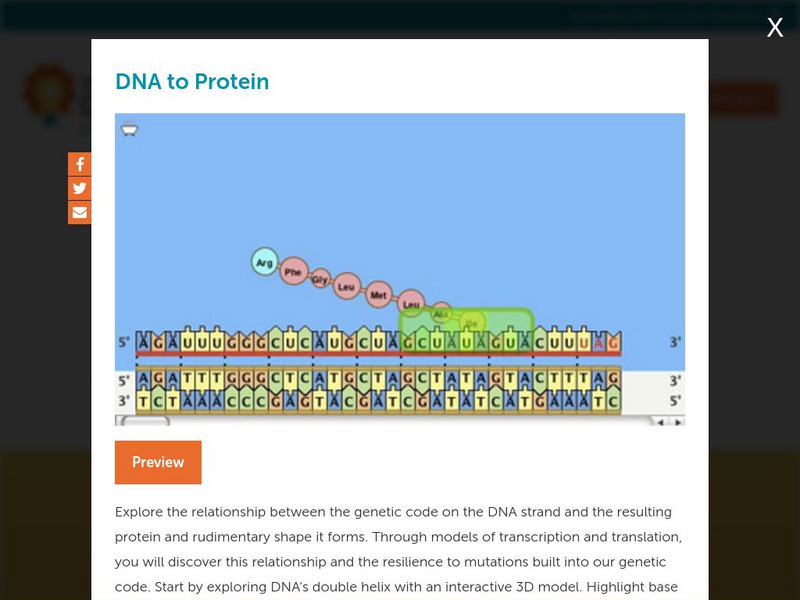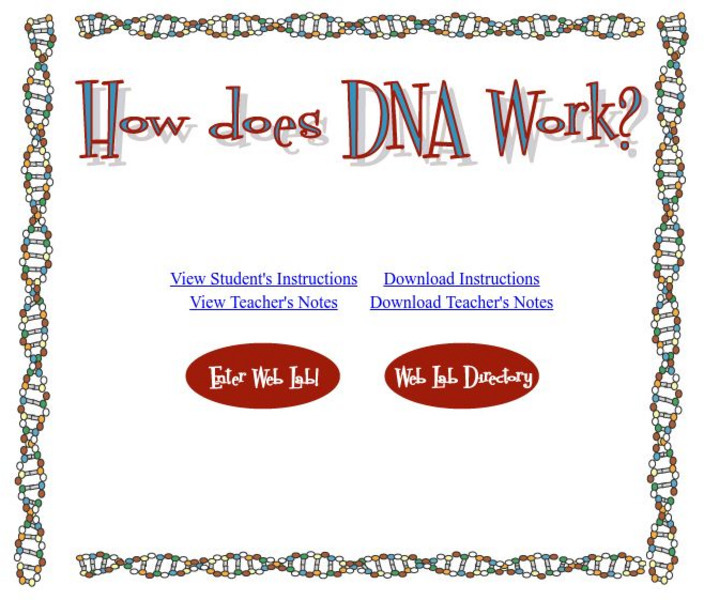Curated OER
Ionic Compounds
In this ionic compounds worksheet, students identify the number of electrons gained or lost in ions, they show that transfer of electrons in ionic compounds and they write balanced ionic compounds given ions. They answer 4 questions...
Curated OER
Animals and Humans Say the Darnedest Things
Students explore and analyze human and animal communications and create a short film that illustrates their findings.
Curated OER
Ethical Decision Making in Biology
Students explore a model that illustrates the spread of HIV through an adolescent population. Acting in the role of epidemiologists, students explore the dilemmas of HIV infection presented by a simulation. Students produce a play, skit,...
Curated OER
Biotechnology
In this biology worksheet, learners complete a crossword puzzle with 23 questions on biotechnology. They identify the benefits and ethical issues about biotechnology.
Curated OER
Using Blood Tests to Identify Babies and Criminals
Students solve a crime by matching a suspect's blood type to physical evidence collected at the crime scene. In this forensic science lesson, students identify the different blood types. They explain how blood tests work.
Curated OER
Genome Interactions
In this genome interactions worksheet, students read the passage about genome interactions then apply the knowledge to answer several short answer questions.
Curated OER
Born of Blood: Inheritance of Blood Types
Students examine inheritance of blood types. In the chromosome lesson, students create a model of chromosome and predict the blood type of offspring.
Curated OER
Case of the Threespine Stickleback
Pupils examine why some freshwater populations of stickleback fish. In this macroevolution lesson plan students read a study packet then answer questions.
Curated OER
Nutrient Biochemistry
For this nutrient biochemistry worksheet, students complete the blanks with information about nucleic acids and the process. Students also draw a figure referenced in the text given.
Curated OER
Cells and Cancer
Students idenitfy that cancer is a growth of mutated cells and that cancer cells are only one type of cell that causes disease in our body. They also identify that all eukaryotic cells contain a nucleus, cytoskeleton, and a cell...
Khan Academy
Khan Academy: The Genetic Code
Learn how genetic code links groups of nucleotides in an mRNA to amino acids in a protein. Also learn about start codons, stop codons, and reading frame.
Khan Academy
Khan Academy: Early Experiments on the Genetic Code
Read a passage about early experiments on the genetic code and answer the follow-up questions.
CK-12 Foundation
Ck 12: Biology: Protein Synthesis Study Guide
This study guide on protein synthesis covers key terminology, protein molecules and the genetic code, RNA types and their roles, transcription, translation, and a few misconceptions. It is available for download with free registration.
Concord Consortium
Concord Consortium: Stem Resources: Dna to Protein
Investigate how the genetic code on a DNA strands controls what protein is produced with this collection of animations and 3D models. Explore an interactive 3D model of the double helix, watch an animation of transcription, and see the...
Concord Consortium
The Molecular Logic Database: Mutations: Changing the Genetic Code
Students will learn about the different types of mutations and how they work. They will compare the effect of these different types of mutations in DNA, including nucleotide substitution, nucleotide insertion, and nucleotide deletion....
City University of New York
Bio Lab Module: Breaking the Genetic Code
Try this interactive module from the Brooklyn College to help understand the genetic code and how changes in the code effect the final protein product.
CK-12 Foundation
Ck 12: Plix: Genetic Code
[Free Registration/Login Required] Synthesize a protein by dragging the amino acids to the corresponding codon on the mRNA segment. You will need a sign-in to access this interactive but it will be well worth your time!
Education Development Center
Education Development Center: How Does Dna Work?
Learning about transcription and translation can be difficult but this animation helps make the processes less confusing. The animation is interactive and it also covers the overall importance of proteins.
Cold Spring Harbor Laboratory
Dna From the Beginning: One Gene Makes One Protein
Early research showed that genes code for proteins. This was based on studies using mutant strains of bread mold. This multimedia article includes animations, pictures, video, biographical information, and quiz questions that are...
Concord Consortium
Concord Consortium: Molecular Workbench Showcase: From to Dna to Proteins
Investigate protein synthesis in this learning module.
National Institutes of Health
Nih: Deciphering the Genetic Code: Michael Nirenberg
Story of Michael Nirenberg and his colleagues deciphering of DNA.
Estrella Mountain Community College
Estrella Mountain Community College: Protein Synthesis
A look at protein synthesis in words and pictures. This website discusses the processes of replication, transcription, and translation. Also covered is Beadle and Tatum research that explains that one gene codes for one polypeptide....
Estrella Mountain Community College
Estrella Mountain Community College: Translation
For the section including translation, go to "the genetic code" chapter in the table of contents. This explanation includes diagrams and illustrations as well as a codon code table.
Cold Spring Harbor Laboratory
Dna From the Beginning
At DNA from the Beginning, choose from classical genetics, molecules of genetics, genetic organization and control. Each concept is explained through animation, an image gallery, video interviews, biographies and links.
























